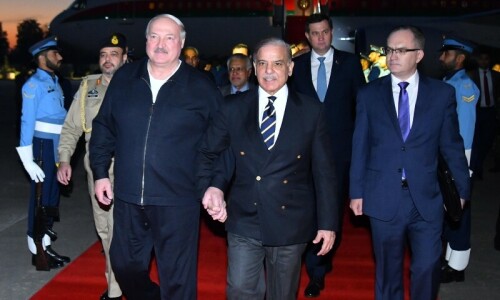ISLAMABAD, Oct 20: The International Monetary Fund will begin assessing the health of Pakistan’s economy in Dubai from Tuesday, which may spur other multilateral lenders and ‘friendly’ countries to dole out funds to avert an economic meltdown.
A technical delegation left here for the UAE to meet IMF representatives because of security threats in Pakistan.
These talks – called Article IV consultations – are regular, usually annual, discussions between IMF and member countries concerning their economic and financial policies.
A senior official said Governor of State Bank Dr Shamshad Akhtar and Secretary Finance Dr Waqar Masood would join the team in a day or two.
“This is a normal meeting but a positive signal from the Fund will give encourage International Financial Institution (IFIs) and others to release funds which are already in the pipeline to help fill the balance of payment gap,” the official said.
An IMF technical team had visited Islamabad last month and gathered relevant information from all ministries regarding the country’s economic health.
The official said Pakistan would strongly pursue its plan to secure help from multilateral lenders and the ‘Friends of Pakistan’ forum to line up funds with an immediate lifeline of about $4 billion to help bridge the gap in balance of payment.
Expressing hope that financial help would be forthcoming from IFIs and ‘Friends of Pakistan’, the official said if the country got no help, Pakistan would be left with no other option but to go for an IMF programme to avoid defaulting on its debt obligations.
Pakistan’s normal quota with the IMF stood at $1.6 billion.
“If Pakistan goes for an IMF programme, then it depends on the percentage of support to be approved by the Funds’ board of director,” the official added.
He said if the support was around 600 per cent in the basic quota, it would get about $9.5 billion. But, if the support was 400 per cent, the loan amount would be $6.15 billion.
Pakistan has so far spent billions of dollars on import of wheat, edible oil and petroleum products, eroding its forex reserves over the past year, deteriorating the health of rupee and balance of payments position.
At the last review in December 2007, the IMF had come out with a mix reaction about Pakistan’s economy. It noted that although the country had achieved positive developments in some sectors, it was plagued by rising current account deficit and higher-than-anticipated inflation.
Pakistan will now plead its case before the IMF solely on its home-grown programme and the economic fallout of the war on terror, which has now climbed to an unbearable level. “A very negligible portion of these costs had been defrayed by our partners,” the official said.
Advisor on Finance to Prime Minister Shaukat Tarin has already told IMF that Pakistan had successfully adjusted to unprecedented increases in petroleum and electricity prices by eliminating nearly all subsidies. “The pain inherent in this adjustment can be gauged by the fact that these prices have nearly doubled or will be doubled at the close of the adjustment,” he added.
“We are drawing fundamental programmes to further restructure our economy and strengthen our institutions of governance so that we are better prepared to face such challenges in the future,” Mr Tarin had said.












































Dear visitor, the comments section is undergoing an overhaul and will return soon.